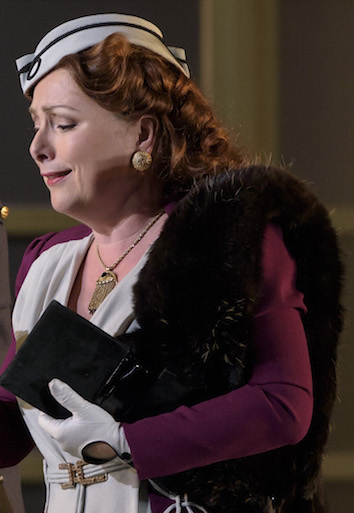It’s almost impossible to imagine what a Handel opera performance can have been like in London in the 1730s, when Orlando first appeared. The audience came primarily to hear their favourite singers: and these must have been sensational, if not unduly dedicated to the dramatic verities they were supposed to be representing: castrati like Senesino and Farinelli, sopranos like Cuzzoni and Faustina (who once came to blows onstage, presumably trying to upstage one another). Nobody cared much about plot or character, but they loved the magical effects: Zoroastro whisking Orlando away in a flying chariot, or summoning an eagle with a golden bowl to cure his madness.
None of this sort of thing cuts much ice today, partly for the sour-grapes reason that we mostly haven’t the singers and can’t afford the effects. WNO’s new production, by Harry Fehr, is nicely sung, smartly played, and on the whole competently directed. But it would hardly have interrupted the chitter-chat and card games in the King’s Theatre boxes in 1733.
The sopranos are best, without, thankfully, bashing each other
Fehr’s worthy attempt, with designer Yannis Thavoris, to make something serious out of this farrago of crazed passion cured by benign sorcery – by setting it in a psychiatric hospital, with Orlando as patient-in-chief and Zoroastro as a kind of cross between Mesmer and Oliver Sacks – merely draws attention to the basic vacuity of the scenario. Maybe with great singers strutting the stage, with lights flashing and characters vanishing in puffs of smoke, Orlando might make good pantomime. As music drama it’s dull at best
As usual with Handel, though, the music itself is another matter. Surely there was never a composer who could turn out such an endless stream of unforgettable musical vignettes in so short a space of time and with barely any lapse from the highest level of invention and workmanship. Yet even by his standards, Orlando is exceptional. I would single out the heroine Angelica’s beautiful aria “Verdi piante,” and her last act duet with Orlando, which has some flavour of a Bach dialogue chorus. But really the quality is nonstop. And Handel was a music-dramatist in the sense that his aria motifs catch the emotional moment, even if they lead nowhere dramaturgically.
 In Cardiff, the singers labour with Fehr’s concept, including his indistinct (and puzzling) back-projections of Edward VIII and Mrs Simpson. But they are up for their Handel, relishing its melodic and arabesque brilliance, even if not quite finding the circus virtuosity that enthused Handel’s own audiences. The sopranos are best, without, thankfully, bashing each other. Rebecca Evans (pictured right) is an admirably poised Angelica, elegant and stylish, and suddenly very moving in “Verdi piante”; Fflur Wyn is delightful as poor Dorinda, originally a forlorn shepherdess, reduced by Fehr to nursing lunatics – fair comment, I suppose, on the NHS today. Both sopranos are technically superb, lacking only that last degree of bravado that brings audiences to the edge of their seats.
In Cardiff, the singers labour with Fehr’s concept, including his indistinct (and puzzling) back-projections of Edward VIII and Mrs Simpson. But they are up for their Handel, relishing its melodic and arabesque brilliance, even if not quite finding the circus virtuosity that enthused Handel’s own audiences. The sopranos are best, without, thankfully, bashing each other. Rebecca Evans (pictured right) is an admirably poised Angelica, elegant and stylish, and suddenly very moving in “Verdi piante”; Fflur Wyn is delightful as poor Dorinda, originally a forlorn shepherdess, reduced by Fehr to nursing lunatics – fair comment, I suppose, on the NHS today. Both sopranos are technically superb, lacking only that last degree of bravado that brings audiences to the edge of their seats.
The men are more problematic, simply because, through no fault of their own, they have the wrong voices. Modern altos, however talented, can’t do Senesino. Lawrence Zazzo is, nevertheless, pretty good as Orlando, projecting well into this big theatre and going mad tastefully if not quite frighteningly. Robin Blaze manages adequately the rather flat part of Medoro, whose main role is to walk in and out of swing doors, telling Angelica he loves her and Dorinda he doesn’t. But Daniel Grice is miscast as Zoroastro, a true bass part sung here by a baritone. The loss of authority is damaging but perhaps not disastrous, since the production undermines him in any case.
The orchestra is WNO’s, reduced but with added theorbos and harpsichord, conducted, though, from the rostrum by Rinaldo Alessandrini. Sadly no violette marine, whatever they might be, in Orlando’s sleep aria, but plain violas, played senza vibrato. Good that the company don’t bus in a baroque orchestra for Handel, but simply turn their hands to it as to any other repertory opera. Whether Orlando could ever be repertory in that sense I’m not sure, but not, probably, until directors accept it for what it is.















Add comment